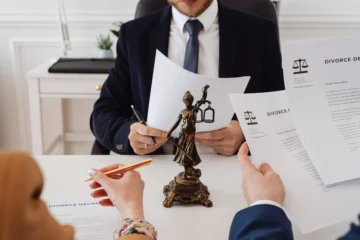Victims of car accidents may experience feelings of helplessness, perplexity, and uncertainty about their legal rights. It can be challenging to navigate the legal complexities that arise after an incident without feeling like you are in a dangerous maze. But do not worry! We’ve got all the information you need to comprehend the legal nuances of a car accident case in one comprehensive guide. Strap in as we unravel the mysteries and equip you with the knowledge to pursue justice and compensation confidently. From understanding liability to addressing insurance claims, buckle up for an enlightening journey through the legal maze that will empower every car accident victim.
Introduction to the Legal Maze of Car Accidents
In today’s fast-paced world, car accidents are unfortunately a common occurrence. They can happen to anyone at any time and often result in physical injuries, emotional distress, and financial burdens. In the aftermath of a car accident, victims are often left feeling overwhelmed and confused by the legal process that follows.
The intricate network of laws, rules, and procedures that control how car accident cases are handled is called the “legal maze of auto accidents.” For those who have never been in a car accident, figuring out this maze alone can be difficult.
Seeking medical attention for injuries sustained in an automobile accident should be among your priorities. After receiving the immediate medical attention you require, it’s critical to comprehend your rights as a victim. This entails knowing your legal options and what actions to take next.
Determining fault is an essential aspect of any car accident case. To receive compensation for damages and injuries sustained in a car accident, it must be proven that another party was at fault for the collision. This can involve gathering evidence such as witness statements, police reports, and photographs from the accident scene.
Knowing insurance policies is also essential to navigating the legal system. Although most states require drivers to carry a minimum amount of coverage, not all insurance policies are equal. Some may offer more comprehensive coverage than others or include specific clauses that could affect your claim after an accident.
What to Do Immediately After a Car Accident
After a car accident, it can be challenging to know what to do first. Your adrenaline may rush, and you might feel overwhelmed or confused. However, there are several essential steps that you should take immediately after a car accident to protect yourself legally and physically.
1. Check for Injuries: Examine yourself and any passengers in your car for injuries as soon as possible after an accident. For emergency medical assistance, dial 911 right away if you or anyone else has suffered a severe injury.
2. Move to Safety: If the accident is minor and no one is seriously injured, move your vehicle to a safe location. This will help prevent further accidents or injuries from occurring.
3. Call the Police: Even if the accident seems minor, it’s always best to call the police and report the incident. They will create an official report that can be crucial when dealing with insurance companies or legal proceedings later.
4. Exchange Information: Talk to the other driver or drivers about your insurance and exchange contact details while you wait for the police to arrive. Ensure you also obtain their name, phone number, address, car make and model, license plate number, insurance company, and policy number.
5. Document the Scene: Take photos of both vehicles involved in the accident from various angles and any visible injuries sustained by you or your passengers. This evidence can help determine fault later on.
Understanding Your Rights as a Victim
Being in a car accident can be a frightening and distressing event. As a victim, you may have to deal with legal issues in addition to physical wounds and property damage. Knowing your rights as a victim is crucial to navigating the convoluted legal system.
1. The Freedom to Receive Medical Care
If you have been in an automobile accident, getting medical attention for any injuries you may have received should come first. This is crucial for your health and any future legal claims against the at-fault party. Sometimes, injuries don’t show up immediately after the collision, so even if you feel OK initially, you should still get medical help.
2. The Right to File a Personal Injury Claim
If you have suffered physical or emotional harm due to the negligence of another driver, you have the right to file a personal injury claim against them. This allows you to seek compensation for medical expenses, lost wages, and pain and suffering. However, there are specific deadlines for filing these claims called “statutes of limitations,” so it’s essential to act quickly.
3. The Right to Legal Representation
While handling your personal injury claim independently is possible, having an experienced lawyer by your side can significantly increase your chances of receiving fair compensation. A lawyer can help you negotiate with insurance companies and navigate through complicated legal processes on your behalf.
Hiring a Car Accident Lawyer: Why and When?
Hiring a car accident lawyer can be crucial for anyone involved in a car accident. Even though many people might believe they can manage the legal system independently, it’s essential to realize the difficulties and dangers of doing so on your own. This section will discuss the need for and circumstances surrounding hiring a car accident attorney.
Why Hire a Car Accident Lawyer?
1. Legal Expertise and Knowledge: State-by-state changes are frequently made to auto accident laws. An accomplished automobile accident attorney can guarantee that your case is handled effectively and efficiently because they have great knowledge and experience with these laws. They possess the know-how to negotiate with insurance companies, obtain evidence, handle complicated legal procedures, and, if needed, represent you in court.
2. Maximize Compensation: In most cases, insurance companies will try to settle for the lowest possible amount or deny your claim. A skilled car accident lawyer knows how to build a strong case and fight for your rights, so you receive fair compensation for any medical bills, lost wages, property damage, pain and suffering, and other losses resulting from the accident.
3. Objectivity: Emotions can run high after an accident, impairing decision-making when interacting with insurance providers or handling your case. By working with a car accident attorney, you can get impartial counsel from someone with case-specific experience.
The Legal Process: From Filing a Claim to Settlement
The legal process involved in filing a claim and seeking settlement after a car accident can be complex and overwhelming for victims. In this section, we will break down each step of the legal process to give you a better understanding of what to expect.
1. Filing a Claim:
To obtain compensation for your injuries and damages, you must create a claim with the driver’s insurance company who caused them. This entails completing all required paperwork, including police reports, medical records, and other accident-related evidence.
2. Investigation:
Once the claim is filed, the insurance company will investigate the accident. This could entail evaluating vehicle damage, reviewing scene images or video, and conversing with witnesses. Remember that insurance companies frequently have their interests in mind, so having solid proof to back up your claim is essential.
3. Negotiation:
After completing their investigation, the insurance company may offer a settlement amount for your claim. This amount may only sometimes be fair or sufficient enough to cover all of your losses, so it is essential to negotiate with them if needed. You can do this by presenting additional evidence or hiring an experienced personal injury attorney who can advocate on your behalf.
4. Lawsuit:
If negotiations fail and a fair settlement cannot be reached, a lawsuit may need to be filed against the at-fault party in civil court.
Common Challenges in Car Accident Cases and How to Overcome Them
Car accidents are standard on the roads; unfortunately, they can result in severe injuries and damages. It is crucial to realize that navigating the legal system can be complicated and intimidating if you have been in a car accident. This section will address some typical obstacles that may come up in cases involving auto accidents and offer advice on how to get past them.
1. Dealing with Insurance Companies
One of the most significant challenges in a car accident case is dealing with insurance companies. While they are supposed to protect their customers, their main goal is to minimize their financial liability. This means they may try to downplay your injuries or offer you a low settlement amount.
To overcome this challenge, having an experienced personal injury attorney by your side who can negotiate with the insurance company on your behalf is crucial. They will have the experience and knowledge to handle these negotiations effectively and ensure you receive fair compensation for your injuries and damages.
2. Proving Liability
To have a successful car accident case, you must prove that the other party was at fault for the accident. However, this can frequently be challenging as both crash participants might have made contradictory statements.
Collecting as much evidence from the accident scene as possible is imperative to overcome this challenge. This entails documenting any injuries or damages with photos, gathering witness accounts, acquiring police reports, and keeping track of any tangible evidence, like skid marks.
Conclusion: Taking Control of Your Legal Journey
After a car accident, the legal process can be intimidating and perplexing, but with the correct information and strategy, you can take charge and successfully navigate it. This last section will offer advice on managing your legal journey successfully and a summary of the essential topics covered in this extensive guide.
1. Seek Medical Attention: The first step after a car accident is to seek medical attention for injuries sustained. It is crucial for your health and your case, as medical records serve as evidence for any damages.
2. Gather Evidence: Gathering as much evidence as possible at the accident scene is essential. This includes taking photos of the damage, obtaining witness statements, and getting a copy of the police report.
3. Get in Touch with Your Insurance Provider: Report the accident and begin the claims procedure with your insurance provider as soon as possible. When conversing with them, exercise caution and avoid assigning blame or downplaying any injuries.
4. Consult with an Attorney: If you have suffered significant injuries or are facing challenges with your insurance company, consult a personal injury attorney with experience handling car accident cases.
5. Recognize Your Rights: Learn about your rights if you were injured in a car accident. This includes being aware of the various forms of compensation to which you might be eligible, including lost wages, medical costs, pain and suffering, etc.
Stay in touch to get more updates & alerts on Washington Greek! Thank you



